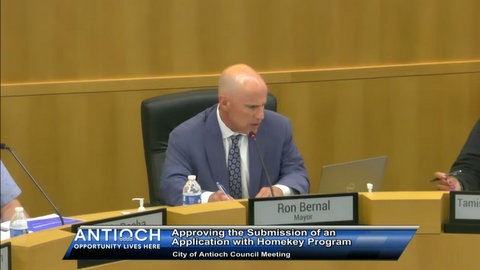
27 May Antioch Advances Homekey+ Application for Supportive Housing

“This is adding a lot of cost,” said Antioch Mayor Ron Bernal, who was the only City Council member to vote against the city applying for a Homekey+ permanent housing project. “It’s really a $19 million commitment.” (Screenshot captured by Samantha Kennedy / The CC Pulse)
By Samantha Kennedy
In an effort to support the city’s unhoused population, Antioch council members on Thursday approved the submission of a Homekey+ application for a permanent housing project that could cost up to $18.75 million over the next 15 years.
The city would pay up to $1.2 million annually for the project for at least five years, in addition to a $750,000 operating subsidy, all while it looks to address a multiyear deficit.
“This is probably the worst time to come forward to the city,” City Council member Don Freitas said during the special meeting. “We are compounding that problem by moving forward, but if we don’t do something, the problem (here) is going to get greater and greater, and the demand is going to get louder and louder.”
The Homekey+ program is administered by the California Department of Housing and Community Development. If it approves Antioch’s application, California Supportive Housing, a nonprofit that has helped build other affordable housing in the Bay Area, would turn a current Comfort Inn on Mahogany Way into a permanent housing site with up to 85 units for homeless families and individuals who have experienced behavioral health issues. The project can be extended twice, each for a period of five years.
Mayor Ron Bernal was the only vote against the application because of, he said, the increased financial burden the city would face without any “good alternative to trim it down.”
“This is adding a lot of cost,” he said. “It is not a one- or two-year commitment we are making. It’s really an $18 million commitment, plus the $750,000, so it’s really a $19 million commitment.”
Advocates — namely, Andrew Becker, who co-presented Thursday’s application — have for years called on the city to pursue Homekey project funding, which helps agencies expand housing for those at-risk of or experiencing homelessness. Homekey+ is an expansion of the project that specifically serves veterans and those with behavioral health issues.
Antioch is home to Contra Costa County’s largest unhoused population, according to Point-In-Time data from 2024. Of the respondents to last year’s survey, 61% reported having at least one household member with a mental health condition.
Council members have OK’d more funding for county services and a city-dedicated Coordinated Outreach Referral Engagement team and convened two bodies to tackle homelessness over the last year in response to the increased need for shelter and services. Council members also extended the lease for Opportunity Village, a transitional housing site, at a former hotel at the beginning of the month for another 18 months.
Some previous solutions brought forward by the last council majority were “temporary fixes,” said resident Melissa Case, who also said the city needed “transformative change.”
Approving the project “is not just a compassionate thing to do; it’s also strategic to the vitality of Antioch,” said Case, who rejected the perception by some that the city cannot attract business or features because it doesn’t “have the right demographics.”
Case is, in part, referring to the decision by the San Joaquin Joint Powers Authority to close the Pittsburg-Antioch Amtrak station due to blight and safety concerns with residents in the area who are homeless.
Council member Tamisha Torres-Walker said she understood the financial impact the project would have but said the cost of sweeping homeless encampments was even higher.
The city has “a contractor go out to the encampments with APD (police), Public Works, the CORE team, all showing up on the scene at the same time,” she said. “You spend more money that way trying to address the issue, rather than in the future spending less on a permanent solution.”
Months before Freitas, Bernal and Louie Rocha were elected to City Council, the U.S. Supreme Court handed down a ruling in June 2024 that allowed cities to ban people from sleeping in public places even if no other shelter is available. Gov. Gavin Newsom soon after directed state agencies to clear homeless encampments or risk losing state funding.
Then-Mayor Lamar Hernandez-Thorpe called for a stricter camping ordinance to safeguard $6 million in state funding the city had applied for. The ordinance itself didn’t change, but Antioch later received the grant and used a portion of it to pay for the city-dedicated CORE team.
Advocates said homeless encampment sweeps are still harming unhoused residents and hoped the project would in some way stop them.
Bernal said that wouldn’t be the case. “There will still be a need to move folks who are not in places that are acceptable to the city,” he said.
Newsom built on last year’s call to clear encampments this month after revealing a statewide model that local agencies could use to address encampments. The plan was accompanied by $3.3 billion in funds to expand housing and treatment for those who are homeless.



Tisha Stephenson
Posted at 16:54h, 09 JulyYes I would like to know why these Police in Pittsburg, Antioch, Oakley are quick to arrested the homeless / unhoused on just basis of being homeless is now illegal, This is the most stupid thing ever and supposedly Gov. Newsom had put the order out to all police agencies to put it in effect immediately! Something has to be done ASAP before this situation gets out of hand